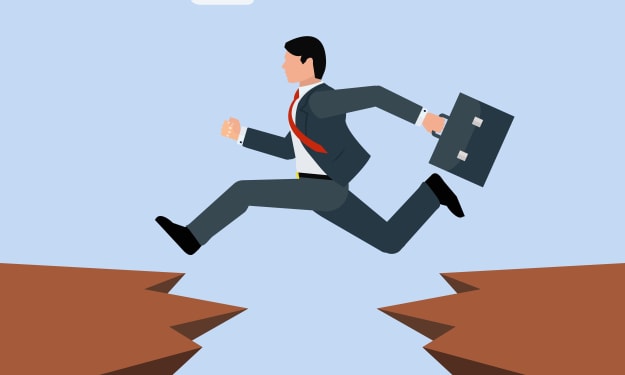Five Things I Learned From My Panic Disorder
It came out of nowhere.

My “2020: A Series of Unfortunate Events” started before the COVID lockdowns. I was driving down the highway in the middle of the city. There was late morning traffic. Next thing I know, I’m waking up, as if for the first time that day, being loaded onto an ambulance. I was moaning and groaning in pain, vomiting every few seconds, utterly confused as to what was going on. It took a few moments before I was able to comprehend what the paramedic was telling me: I had had a seizure.
Barely two-and-a-half hours later, I was walking out of the hospital with my mom, almost feeling like I was on top of the world. Sure, my car was completely totaled, but I walked away with nothing except for a couple of small marks on my left hand, possibly from when someone shattered the car window to help me out of the vehicle. (I estimate I was unconscious for about 20-25 minutes.) I was amazed at how little damage it did to me.
I was proven wrong three days later.
My dad gave me a ride to the store and we did our own grocery shopping, the first time I was out of the house since the accident. I finished before him and waited near the exit. It was then that I truly realized how quickly I was rapping my fingers on the cart and shaking my leg. I was tensing all over, my breathing was heavy, my heart felt like it was beating fast, and I was beyond ready to get back home. Finally we did, I rushed into my room, and when I was sure no one could see me, my knees bent and I broke into tears. This was something I had never experienced before. I had known about conditions like PTSD and anxiety disorders, but back then I had only known about them based on knowledge. Now, I know based on personal experience.
Panic attacks became a common occurrence for me in the following weeks and months. More often than not, it didn’t really matter where I was or what I was doing. It was like an evil version of that obnoxious paper clip in the old Microsoft Office: “It looks like you’re having an enjoyable day. Would you like to remember your traumatic incident and feel like you’re now going to drop unconscious on the floor?” Furthermore, developing a panic disorder right at the start of a pandemic mixed with election season and wildfires and social isolation and murder hornets? Do not recommend.
It’s been about a year since the accident now. I can’t say I’m completely cured (whatever that would even look like), but I am happy with the progress I have made. Here are some things I have learned in the process.
*Also, please don’t take this as professional advice. There are licensed, and more qualified, people for that.
#1: Give yourself time. Very early on, especially after a panic attack, I kept telling myself that I was “never” going to get better, that I was never going to be comfortable behind the wheel again, no matter what type of therapy or treatment I tried. However, I haven’t had a seizure since the accident, and I’ve gone through enough counseling to the point where I do feel comfortable behind the wheel again, and panic attacks are somewhat rare nowadays. Granted, a lot of places are still closed, so the only reason I ever really go out is to do grocery shopping, but hey, it’s progress.
Rather, instead of saying “never”, try acknowledging that you may simply need to allow yourself more time to heal. Also, if there was a specific event that caused some form of trauma, think back to the progress you might have already made. For me, back then I couldn’t even bear to hear the sound of an ambulance siren, and due to where we live, I hear that a lot. Now, it doesn’t really trigger anything anymore.
#2: Start out small. This will look different for everyone since we experience trauma and anxiety in different ways, so I can only speak for myself here. I started out by reading one news article about a car accident. Another week, I deleted Facebook from my phone (a different source of anxiety). A few weeks later, I watched a dash cam video of a leisurely drive. Eventually, I asked my mom if she could drive me past the scene of my accident. That was just over eight months after it had happened.
For me, it was a matter of forcing myself to take the plunge and telling myself that I can’t expect the world to cater to my every need in order to make me feel comfortable. Life is going to throw curveballs. For all I know, there may come a time when someone will need to rely on me to drive past that area. No idea what the circumstances would be, but you never know. I still have yet to actually drive past there on my own, but I’m in no rush.
#3: Illnesses aren’t solely external things. I’m no neuroscientist, but I can safely say we all have brains, and these brains have different components with different functions. Trauma affects the brain. We enter “fight-or-flight” mode. Our thoughts race. As Dumbledore once said, “Of course it’s happening in your head...but why should that mean it’s not real?”
#4: Find out what works best for you. I can’t say there is a one-size-fits-all solution for anxiety or panic disorders. Plus, a technique that works today may not work tomorrow, or vice versa. There are plenty of things at least worth trying out. It could be splashing cold water on your face. It could be gripping an ice cube for several seconds. It could be yoga or meditation. It could be journaling your thoughts. It could be triangle breathing. It could be snapping twigs or punching a pillow if you’re angry. It could be recognizing your thought patterns (all-or-nothing thinking, catastrophizing, mind reading, setting unrealistic expectations, etc.) and coming up with more balanced thoughts.
About a week after my accident, I went to work (after being given a ride). As I sat in the office, I suddenly felt a sense of impending doom, like I was about to get into another car accident. I tried telling myself that I was being irrational: “Of course I’m not going to get into an accident when I’m sitting here in the office.” Acknowledging that my thoughts were irrational did not help, though, and I catastrophized it by telling myself I was going to have a seizure and then get in a car accident, so part of me wanted to rationalize it: “It’s not irrational to think I’m suddenly going to have another seizure when that did, in fact, happen before.” So the coping technique of recognizing irrational thoughts didn’t help me in the moment, but afterward I did come up with more balanced thoughts: “Yes, I had a seizure that day, but I haven’t had one since, and I am taking steps to make sure another one doesn’t happen.”
Instead, I ended up giving myself space from everyone and allowing myself enough time to recompose my breathing, waiting for the panic attack to abate and my body to relax. Afterward, I realized that while I may have a panic attack, it’s not going to last forever, that it will pass with time. That line of thinking is certainly not the cure, but for me, it’s at least a bit of a comfort from time to time.
#5: Not everyone understands mental illness. As I mentioned earlier, before my accident I had only really known about mental illness, but now that I have experienced it, I see it in a whole new light. I wouldn’t wish it on anyone, but I do wish everyone understands that it is not as simple as “being in a bad mood” or “feeling down”. Comments like “can’t you just get over it” and “look on the bright side” may sound helpful to those unfamiliar with it, but if you tell me to “get over it”, I might just throw something at you. I can’t just “get over it”, especially when it pounces on me like a tiger out of nowhere. (There have been times when my stress level went from 1 to 7 in a heartbeat because a news alert about a car crash popped up on my phone...The most recent time that happened was barely two weeks ago at the time of this writing.)
I have tried to look on the bright side: I walked away from that accident without a single physical injury, and last year was the ideal year to total my car. Everything was closed anyway, and I saved on gas and car payments, which was nice considering my income had dropped. Looking at the positives didn’t hurt, but it didn’t exactly make my anxiety go away either.
Now what I’m about to say may be difficult (possibly even unpopular), but I learned that it’s important to be patient with those who don’t understand mental illness. To them, they may think they are appropriately interacting with someone who is in the midst of a panic attack, when in reality they may be exacerbating it. Angry outbursts may be misconstrued as tantrums; breaking into tears may be seen as being overly emotional; depression may be seen as a failure to look at the positives in life.
I get it...feeling like the weight of the world is on our shoulders, or we’re constantly hanging on by a thread...Why should we have the added responsibility of being patient toward those who (at least to our knowledge) don’t suffer as much as we do? To be clear, I’m not saying we should try to be patient while experiencing anxiety at its most brutal. I won't even force myself to do that. Really, it’s about educating them...resolving possible misunderstandings...getting them to better figure out how best to approach you in the future so that they don’t unintentionally exacerbate your anxious thoughts.
Maybe write them a letter. Talk to them directly. (I often see social media posts floating around about what depression and anxiety are really like from those who have it, but keep in mind not everyone uses social media.) Or, if you’re not comfortable talking with them quite yet, find someone you can trust to talk with. Someone who’s gone through what you experienced, or a therapist or counselor. If you’re anything like me, you may find that the more you talk about it - especially with someone/people who is/are supportive in the process - the more you might become comfortable with sharing it.
About the Creator
Enjoyed the story? Support the Creator.
Subscribe for free to receive all their stories in your feed. You could also pledge your support or give them a one-off tip, letting them know you appreciate their work.






Comments
There are no comments for this story
Be the first to respond and start the conversation.